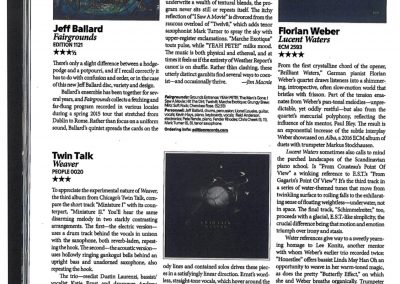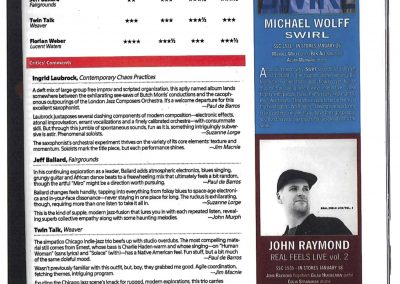Press
NEW YORKER:
“righteous little whirlwind”

NEW YORK TIMES:
“…sparkling ….tantalizing…”

Mit 35 Jahren ist der Pianist Florian Weber auf Augenhöhe mit den internationalen Größen des Jazz. Sein Trio Minsarah ist die Working Band des legendären Saxofonisten Lee Konitz, mit der dieser ein bejubeltes Livealbum im New Yorker Village Vanguard, dem hohen Tempel des Modern Jazz, einspielte. Nun ist dem Deutschen jenseits von Minsarah ein kleines Meisterwerk geglückt. Mit Biosphere hat er etwas geschaffen, was zum Paradigma einer intellektuellen Bauchmusik werden könnte. Im Booklet ist nachzulesen, dass dabei drei Dinge Ziel der Bemühungen waren: Neben dem Klavier sollte das Fender Rhodes zum Einsatz kommen, nord- und westafrikanische Rhythmen sollten integriert werden und mathematische Konstruktionsprinzipien, auch aus der Fugenlehre, sollten eine Rolle spielen. Mit Lionel Loueke, dem ursprünglich aus Benin stammenden neuen Star an der Jazzgitarre, und den höchst versierten New Yorkern Thomas Morgan und Dan Weiss an Kontrabass und Schlagzeug waren dafür die besten Voraussetzungen gegeben. Man kennt punktuell ähnliche Ansätze aus dem Frühwerk eines Wolfgang Dauner oder Siggi Kessler, wo über repetitive, vertrackt groovende Patterns im Bass immer neue, einfach wirkende Motive in verschiebender Schichtung gelegt werden und so ein äußerst magisches, komplexes Geflecht entsteht. Weber und seine Mitstreiter spielen ein souveränes Spiel der Ver- und Entflechtung. Über fünf Originals und fünf Neudeutungen fremden Materials reißt dabei die Spannung nicht ab. Diese immer auch anmutige Musik geht mit Macht in den Bauch, mit Wärme zu Herzen, und hört doch nie auf, den Verstand zu erfreuen.
Thomas Fitterling, 29.09.2012
Blurt online:
„Beautifully crafted and expertly performed, Lucent Waters perfectly displays Weber’s virtues as player, writer and leader.“
„The classically trained German pianist Florian Weber is equally proficient within low-key ambient styles and more agitated jazz atmospheres. However, his second ECM work, Lucent Waters, reveals a steeper inclination to haunting, if occasionally stirring, contemplation. Weber, who is accompanied by a stellar trio of musicians with Ralph Alessi on trumpet, Linda May Han Oh on double bass, and Nasheet Waits on drums, procures to have his eight originals purely layered, describing mostly serene landscapes with transparency and sharp focus.“
spectrum culture
„Florian Weber’s second recording on the ECM label features an all-star band of New York’s best new jazz musicians in drummer Nasheet Waits, bassist Linda May Han Oh and trumpeter Ralph Alessi
Weber came of notice in the United States primarily through his association with alto saxophonist Lee Konitz, with whom he recorded twice between 2007 and 2012. He has also spent recent studio time with luminaries such as Lionel Loueke, Thomas Morgan, Donny McCaslin and Dan Weiss.
Curiously, Weber is one of the few German jazz pianists to make a mark in the United States. It makes sense, then, that this venture was made for ECM, the renowned independent label based in Munich and headed by legendary producer Manfred Eicher. ECM has defined the careers of such jazz giants as guitarists Pat Metheny and John Abercrombie and pianists Chick Corea and Keith Jarrett. Eicher’s releases are among the most sonically distinctive and identifiable of the last 50 years, featuring an aesthetic that tends to the open, the gorgeous and the atmospheric.“

the wonder of balance… worldclass pianist
WASHINGTON POST:
“richly textured and often wonderfully evocative, a celebration of cultural diversity and thematic exploration.”

DOWNBEAT MAGAZINE:
“…defies easy characterization…effective, evocative…”

Florian Weber – Biosphere (2012)
Typically if you want to find the truly forward-thinking jazz pianist these days, you have to go out to whack jazz, where you’ll find visionaries like Matthew Shipp. But there are exceptions, and Vijay Iyer is a notable one. Now add Florian Weber to that short list with the impending release of his second album,Biosphere.
Like Iyer, the German virtuoso keeps his music fresh by introducing not just any foreign concept into jazz but ones that actually fit. And like Iyer, he doesn’t just experiment with melody, he heads to the frontiers on rhythm, too. And lastly, as I’ll expound on in a bit, he like Iyer looks in places for covers where no one else thinks to look.
Weber wasn’t in great need to prove himself; this classically and Berklee trained pianist validated his potential with a memorable stint with Lee Konitz. His Minsarah trio made a record for Enja in 2006 that won accolades back in his native Germany that led to the Konitz gig and other opportunities. Minsarah, the album, is delectable slice of modern jazz that got too little attention in the States (his cover of Miles Davis’ “E.S.P.” is off the hook), but with Biosphere, Weber takes his game a couple of notches higher.
First, he starts with a different rhythm section (Thomas Morgan, bass; Dan Weiss, drums) and then he adds former Berklee classmate and guitarist Lionel Loueke. Loueke doesn’t perform on every track, but the impact is nonetheless jarring, as he’s one of the few guitarists who can remake the whole harmonics of a song just by being himself. Weber wanted to incorporate African tempos in his music, and the Beninian Loueke is the perfect choice, as he not only innately understands the melodies of that region, but the time signatures, too. Listen to how he glides though the 27/16 meter of “Piecemeal,” (YouTube below) and locks into that groove with Weber’s keyboards.
Weber took another step to distinguish his music further by introducing an electric piano. He doesn’t do so on every song, and he will play the acoustic piano right along with it, but that too changes the harmonics of the song, without dominating it. That, along with Loueke, throws off a different sonic shape on a song like “Filaments” that at its core, remains very much a jazz song.
And then, there are covers that don’t follow convention, either. He retains the distinctive piano ostinato on Coldplay’s “Clocks” but slides shifty rhythms underneath it; Morgan’s high octave bass playfully converses with Weber’s electric piano doing a brief break in the action. Weber discreetly deconstructs the melody of Eric Clapton’s “Tears In Heaven” in a solo piano performance on par with Brad Mehldau. He uses the occasion of a Jamiroquai song (“Cosmic Girl”) to demonstrate how the trio can get down while adhering to the lofty principles and complexity they set out to do.
With all these changes, Weber hadn’t abandoned the things that made his first record an artistic success; his piano technique is astonishing on the acoustic trio performance of “Evolution.” Furthermore, you can find the same angularity on a song such as “Biosphere” that was present on Minsarah, even as the presence of Loueke, the Rhodes and Indian percussion on that track add an exotic flavor to it.
Perhaps, then, Biosphere is an incremental step rather than a big leap after all. Either way, it reveals a bold artist willing to take calculated chances in order to create something interesting apart from the rest within the field of jazz.
Biosphere is slated for release on September 11, by Enja Records.
NEW YORK RADIO WKZE:
„fresh and worldclass!“

ALL ABOUT JAZZ:
“Weber’s lines are like those of an expressionist painter: forthright, dark, maybe looking ragged up close, but with a fine sense of composition when you step back. Maybe a little like Thelonious Monk or Don Pullen, except that he doesn’t sound specifically like either of them. The sound will sit well with admirers of Brad Mehldau, with whom Weber shares the same heavy touch on the keys, and the same omnivorous musical appetite.”

BERLINER ZEITUNG:
“dynamic, mature ideas, fresh and innovative”

Vermont Standard, Sean Powers
Three Brushes, One Stroke One listen to “Minsarah” and you find saying that the jazz trio of Florian Weber (piano), Jeff Denson (bass), and Ziv Ravitz (drums) met at Berklee College of Music somehow less fitting than saying they were fused there. The seemingly innate oneness they display throughout the recording is highlighted by their ability to progress simultaneously through diverse musical landscapes. The textures they create blend moods of contemplative introspection, playfulness, and lyrical expression which span a spectrum of near blackness, through muted grays to subtle blues to an occasional glowing white. A casual listener becomes attentive, nearly entranced by the journey on which these young musicians embark. Should one member take the forefront, the others do not become secondary, as can happen when three highly skilled musicians come together. Rather, they remain evenly paced, intricately lacing subtle accompaniments which maintain the communicative interactions. As soloists, each is a skilled interlocutor with their individual instruments….The musicians lead the listener through a maturely molded journey which is well worth the trip.




